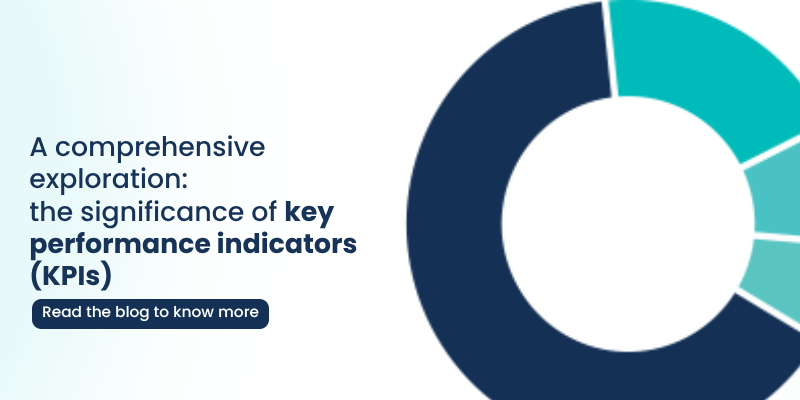
Introduction
In the complex world of modern business, Key Performance Indicators (KPIs) stand as crucial instruments for assessing an organization’s performance and tracking its journey towards its strategic objectives. These business metrics provide a clear and quantifiable lens through which an entity can gauge its progress, make necessary adjustments, address challenges, seize opportunities, analyse trends over time, and maintain a vigilant watch over the overall health of the company. This discourse delves deep into the quintessential reasons why KPIs are indispensable tools for organizations of all sizes and across various industries.
Measuring Progress
A KPI’s primary purpose is to gauge development. An organisation can use it as a trustworthy compass to gauge how well it is moving towards its set goals and objectives. Without KPIs, an organisation would be travelling through a cloud of uncertainty without any way to measure its successes or failures. KPIs offer the required benchmarks against which success can be unmistakably measured, whether a firm wants to boost sales, increase market share, or improve customer happiness.
Making Adjustments and Staying on Track
Business environments rarely remain the same; they are always changing. KPIs serve as early warning systems that notify organisations when their intended trajectory is veering off track. Organisations can quickly reorient their plans when KPI data reveals a deviation from the expected trajectory. For instance, if a business’ KPIs show a reduction in customer satisfaction, it may quickly determine the underlying causes and take appropriate action. Without KPIs, such problems can be unnoticed until they develop into significant catastrophes.
Solving Problems and Tackling Opportunities
KPIs assist organisations diagnose their challenges and possibilities by acting as diagnostic instruments. A KPI should be used to identify performance gaps or areas where goals are frequently missed since they indicate the need for problem-solving initiatives. On the other hand, when KPIs reveal areas of excellent performance or unrealized potential, organisations can take advantage of these opportunities. KPIs enable companies to take a proactive rather than a reactive approach, promoting a culture of innovation and continual improvement.
Analysing Patterns Over Time
The historical perspective that KPIs may provide is one of their enduring advantages. Organisations may learn a lot about trends, cycles, and patterns by monitoring and assessing KPI data over time. This historical perspective helps firms identify long-term performance trajectories and foresee potential problems or opportunities, which leads to better-informed decision-making. KPIs help organisations navigate the complex currents of business with more foresight, whether it be by spotting seasonality in sales, monitoring consumer behaviour trends, or assessing employee productivity patterns.
Monitoring the Company’s Health
Just as an individual monitors their vital signs to assess their physical well-being, organizations rely on KPIs to assess their overall health. KPIs offer a comprehensive view of an organization’s performance across various dimensions, from financial stability to operational efficiency, customer satisfaction, and employee engagement. When monitored collectively, these KPIs provide a holistic picture of the company’s health. Any significant deviations or deteriorations in these metrics can serve as early indicators of potential issues, prompting timely intervention.
Tailoring KPIs to Organizational Goals
It is critical to recognise that selecting KPIs is not a one-size-fits-all process. To be in line with the distinct objectives and top priorities of each organisation, KPIs must be properly crafted. They should be directly connected to the overall goals of the organisation, acting as vital success factors. KPIs must also be quantifiable because their usefulness depends on being able to monitor and track them accurately over time.
KPI Dashboards: Illuminating the Path to Success
In the pursuit of organizational excellence, KPI dashboards emerge as indispensable tools. These digital platforms provide a centralized hub where key performance metrics are aggregated and presented in an accessible and visually compelling manner. KPI dashboards offer several advantages:
- Setting Targets for Each Function: With KPI dashboards, organizations can establish specific performance targets for every department or function within the company. These targets serve as clear benchmarks against which progress can be evaluated.
- Comparing Targets with Actuals: KPI dashboards facilitate real-time comparisons between established targets and actual performance. This feature allows organizations to gauge whether they are meeting their objectives or falling short, enabling prompt corrective action.
- Drilling Down to Employee Level: KPI dashboards offer granular insights, allowing organizations to drill down to the employee level. This capability fosters accountability and empowers managers to identify top performers and areas in need of improvement.
KPI Tracking with BiCXO
With dynamic alerts, notifications, and visually appealing dashboards, BiCXO revolutionises KPI tracking. BiCXO guarantees that organisations remain informed and react to crucial KPI swings by incorporating real-time alerts, enabling quick corrective actions. Teams are kept informed by notifications, which encourages proactive decision-making. While this is going on, BiCXO’s attractive dashboards provide a user-friendly, data-rich interface that transforms complicated KPI data into useful insights. These characteristics make BiCXO the go-to option for contemporary firms looking to improve their KPI monitoring skills, enabling organisations to negotiate the complexities of performance management with accuracy and agility.
Conclusion
In conclusion, BiCXO stands at the forefront of KPI tracking innovation. With its dynamic alerts, notifications, and visually appealing dashboards, BiCXO has revolutionized the way organizations monitor and manage their key performance indicators. By providing real-time alerts, BiCXO ensures that organizations can respond swiftly to critical KPI fluctuations, taking corrective actions with confidence. The notifications keep teams well-informed, fostering a culture of proactive decision-making. BiCXO’s user-friendly dashboards translate complex KPI data into actionable insights, making it the preferred solution for modern businesses seeking to enhance their KPI tracking capabilities. In today’s dynamic business landscape, BiCXO empowers organizations to navigate the intricacies of performance management with precision and agility, setting the course for sustained excellence.

